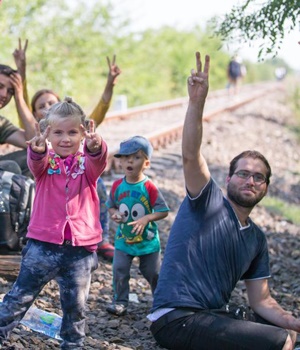
It is early morning on the Aegean promenade in the Turkish coastal town of Izmir. Huddles of people sleeping out in the open slowly wake up.
They used to lead middle class lives with homes and jobs, and most would never have thought they would one day sleep roughly in a foreign land on a pricy journey on which many of their fellow countrymen have died.
These people are from Syria, where a civil war has raged since 2011 and life has become so impossible that this perilous journey is now considered their only option.
“You watch, the big Survivor game,” one of the young Syrian men jokes wryly in broken English. He chuckles as he smokes a cigarette with his friend. The night before, they sought shelter around a sculpture of a shipwreck. Now they are hanging around for a boat to Greece, from where they will make their way up the Balkans to Germany or Sweden. There, they say, their lives can go on.
“Syria [is] history. No longer Syria,” says his friend. The entire journey costs $3 000 (R40 000), but travellers pay their smugglers for each leg, as if to incentivise them to get them there alive.
Official estimates are that 3 million people have fled the country, and 6.5 million have been displaced internally, while the international community dithers over their situation.
A 39-year-old mechanical engineer from Damascus runs his forefinger across his throat to indicate why he doesn’t want his name published. “I’m worried about my family back home; they might be killed,” he says.
His boat to Greece could come any day now. It’s a 14-hour journey under cover of darkness.
Constant danger
Earlier this month, six Syrian migrants, one a baby, drowned during the crossing. UN figures suggest that 21 000 Syrians made the crossing to Greece by the middle of this month. The UN estimates that, last week alone, 7 000 migrants successfully crossed into Greece and up to Serbia.
The flood of Syrians is joined by migrants from Iraq, Afghanistan and Lebanon who can afford the trip. The poorer ones remain behind in Turkey in government-sponsored camps.
“We would rather sleep like this in the open than under explosions [in Syria],” says the engineer. “In Syria there is hatred and killing and it is difficult to live there now.”
The conflict in Syria has caused critical food shortages, and journeys to work that used to take 30 minutes now take five hours. Eating has become too expensive for even those with jobs.
“The big problem is that we are not with the system of Syria and of [President Bashar al-Assad], and not with the Free [Syrian] Army. Our babies like to play; we like that life and we like it as [much as] any people in the world,” says the engineer.
“The trouble is we are a good nation; we like all people in the world. We hate blood and we hate killing,” he adds.
This week it was reported that Germany – the most popular destination for Syrians – suspended an EU rule known as the Dublin Regulation, according to which asylum seekers must be deported if they don’t apply in the first EU country they land in – in this case Greece.
Overwhelmed
As the summit was in session, news broke of an abandoned truck containing the badly decomposed bodies of 71 migrants that had been found on the highway from Budapest, only 40km away.
Syrian migrants have been joined by 137 000 from Africa, of whom 2 300 have died so far while crossing the Mediterranean in ill-equipped boats.
Balkan countries seem overwhelmed by the flood of desperate people and, last week, Macedonia closed its border with Greece for a few days. Scores of refugees had crossed by train or on foot and had walked up the train tracks northwards, often for weeks.
Macedonia was forced to reopen its border after throngs of migrants stormed past police, at a rate, the UN says, that will soon reach 3 000 a day.
Once they reach Serbia, they are given 72 hours to pass through to Hungary, which this week will complete a new 4m-high fence along its 177km border with Serbia to keep out undocumented immigrants.
Back in Izmir, a group of migrants are preparing for their ship, which they say might come that night.
The cheap life jackets they bought earlier that day for 50 Turkish lira (R225) each lie in black bags on the grass, ready with their few items of luggage. One local shop owner is selling 20 life jackets a day.
Muhammad (22), a medical student at the University of Aleppo, says his group has been travelling for a month from Syria and across Turkey to get to the western coast.
He says they walked “through deserts and [over] mountains”, avoiding the main roads, to get there.
His friend, Shiyar (22), a philosophy student with a ruddy, round face, says he wasn’t afraid of the journey. “It’s an adventure,” he laughs. He is staying in a local hotel while waiting for his passage in “maybe two weeks from now”.
The young men say their parents are still in Syria.
Shiyar makes a gesture of a plane with his arms to explain that they will fly over once their sons have found asylum in Germany.
Most Syrian asylum seekers remain in Turkey where they find a friendly reception, but discover that it’s difficult to make a life there. There are between 2 million to 3 million of them.
Betul Durmaz, a sociology lecturer at Izmir’s Gediz University, says the refugees find life tough in Turkey, where many live in government camps.
“We can’t collect data about their social lives or get into the camps without government permission, but we know there are some problems with education because they don’t know Turkish.
“They need education, but government isn’t supplying materials in their language [Arabic],” she says.
Turkey is struggling with its own problems – continued attacks by Kurdish armed group the PKK and a snap election in November.
Many Syrians in Turkey settle in eastern border towns, where most are employed as cheap labour.
Those who make it to Istanbul take whatever jobs they can find.
Many women and children walk between cars in traffic jams in rush hour, begging for food.
Meanwhile, the engineer waiting in Izmir says he cannot speak German, but hopes his aunt, who has lived there for 20 years, can help him. He is desperate for peace. And perhaps, with his skills, he might end up living a “good life”




 Publications
Publications
 Partners
Partners








